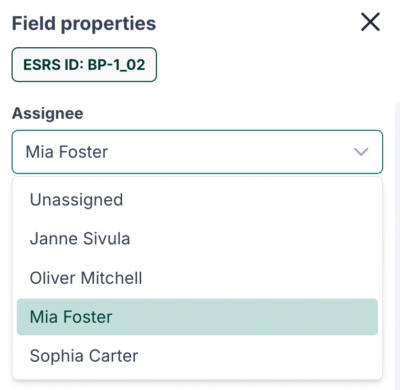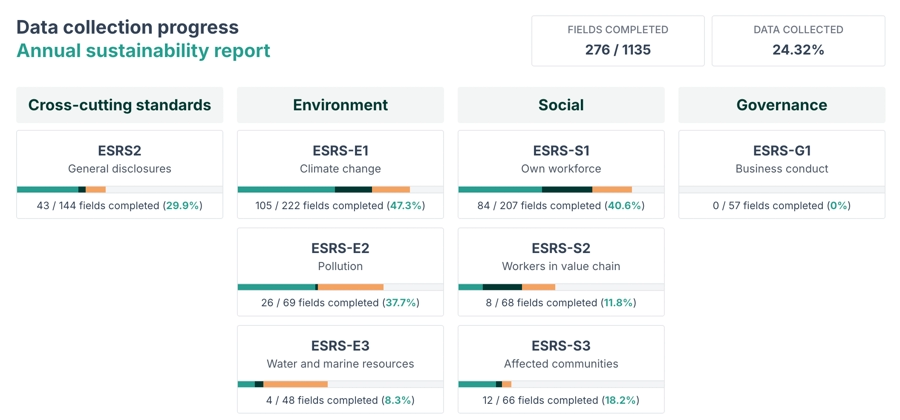ESG Data Collection and Reporting Challenges (and How to Solve Them)
Overcoming ESG Data Collection Challenges: How Planmark’s AI-Powered Software Streamlines CSRD and ESRS Reporting
If you’re preparing for CSRD or ESRS compliance, you’ve likely already encountered the biggest hurdle: fragmented ESG data scattered across teams, spreadsheets, and outdated templates. Without a centralised ESG data collection tool or reliable software, reporting becomes time-consuming and error-prone.
In this article, we break down the most common ESG data collection challenges—and how Planmark’s ESG data collection software helps you turn reporting from a burden into a streamlined, AI-powered process.
Challenges in ESG Data Collection
1. Data Quality and Consistency:
Gathering consistent, reliable, and high-quality ESG data across diverse operations and subsidiaries can be complex. Inconsistent reporting standards and varying data formats further complicate this challenge. Solution: Built-in CSRD -compliant framework with standardised data fields and formats. AI-powered data validation for consistency.
2. Data Availability and Accessibility:
Accessing relevant ESG data can be arduous, especially when information is dispersed across different departments or when external data sources are involved. Lack of standardised frameworks exacerbates this issue. Solution: Centralised ESG data workspace. Automated data mapping from external data sources.
3. Metrics and Materiality:
Determining which metrics matter most (materiality) to a company’s specific ESG performance can be subjective and challenging to assess. Choosing the right indicators is crucial for meaningful reporting. Solution: Guided metric selection aligned with CSRD and industry-specific standards
4. Data Privacy and Security:
With the sensitivity of ESG data, ensuring data privacy and security while adhering to regulations is a significant concern. Balancing transparency with data protection poses a delicate challenge. Solution: Secure cloud infrastructure with role-based access control. Audit trails and GDPR-compliant data handling built-in.
How Planmark can help with data collection and reporting?
Planmark simplifies ESG data collection and reporting by combining regulatory alignment, smart technology, and seamless collaboration tools in one easy-to-use platform. From ensuring compliance with ESRS and CSRD to enabling transparent and interactive workflows across teams, Planmark is designed to make ESG reporting accurate, efficient, and future-proof. Let’s go through some highlights:
1. Built for ESRS and CSDR
Planmark is built to comply with for ESRS (European Sustainability Reporting Standards) and CSDR (Corporate Sustainability Reporting Directive). The smart Plamark reporting platform guides through the data collection and ensures that required data points have been completed.
2. Technology and Automation
Planmark uses advanced technologies to streamline data collection, verification, and reporting processes. Automation reduces errors and enhances efficiency.
3. Collaboration and Engagement
Planmark advocates collaboration among departments and stakeholders improves data sharing and ensures a holistic approach to ESG reporting. Engaging suppliers and partners fosters a more comprehensive view of the company’s impact.
With a simple @person_name tag on any data point, users can easily request feedback or assign tasks to collaborators—keeping the process efficient and interactive.

4. Transparency and Communication
Prioritising transparent communication about data collection methodologies, limitations, and progress instills trust among stakeholders. Openness about challenges demonstrates a commitment to improvement – all handled in a single platform.
ESG Data Collection Template vs. Data Collection Platform
While many companies consider using spreadsheets or templates to manage ESG data, the reality is that this approach quickly becomes inefficient and error-prone. Manual processes might seem like a good starting point, but they often end up costing far more in time and resources.
Here’s the truth from our customers: A Dedicated ESG data platform like Planmark can save 80–90% of the time typically spent on data collection, structuring, and reporting. That’s not a small improvement—we’re talking about hundreds of hours every month once ESG reporting becomes a recurring task.
And the best part? The cost of using a platform like Planmark is only a few hundred euros per month—often less than the cost of one day of manual work. (Pricing)
Spreadsheets & Templates:
-
Heavy manual workload
-
No automation or audit trail
-
Easy to lose consistency across departments
-
Difficult to track progress or version control
-
High risk of errors, especially under time pressure
Planmark Platform:
-
Automated data extraction and mapping
-
Real-time progress tracking and built-in audit trail
-
AI-assisted disclosures aligned with CSRD
-
Saves hundreds of hours per month
-
Costs less than a single day of internal labor
Conclusion:
Instead of “starting small,” it’s often smarter to start smart. Planmark removes complexity and makes ESG data management efficient from day one—so your team can focus on improvements, not spreadsheets.
ESG Data Collection Process
A smooth ESG data collection process is the foundation of reliable, stress-free reporting. We’ve seen that sometimes challenges arise not from reporting itself—but from how the data is gathered and managed.
Here’s a simplified process we recommend for growing companies getting ready for CSRD and other ESG frameworks:
- Define what you need to report
Start by clarifying which ESG framework apply to your business—CSRD, GRI, or others. This defines your data scope and helps avoid wasted effort later. - Identify internal data owners
Assign roles across departments: HR, finance, operations, sustainability, IT. Clear ownership avoids bottlenecks and makes collaboration smoother. In our case, we support your corporate hierarchy, and you can easily invite all collaborators with roles defined for each individual. - Centralize and structure your data
Use a centralized platform to gather all ESG data. For a very low monthly cost you are able to move from spreadsheets and internal systems to third-party sources. Planmark helps automate this step by extracting and mapping data into the correct ESG datapoints. (Book demo) - Automate where possible
Manual work is time-consuming and error-prone. With Planmark’s AI, you can automate data extraction, pre-fill disclosures, and track progress in real time—saving both time and nerves. - Validate and review
Ensure that all data is accurate, consistent, and traceable. This is key for audit readiness, continuous improvement, and internal decision-making.
Companies that follow a clear ESG data collection process are better equipped to stay compliant, reduce workload, and make informed sustainability decisions—without the chaos.
The Role of ESG Data in Strategic Decision-Making
Effective ESG data collection forms the backbone of sustainability reporting and informed decision-making. Companies that systematically gather data on environmental impact, social responsibility, and governance practices are better positioned to understand their risks and unlock improvement areas. As regulatory pressure increases and investors demand greater transparency, ESG data collection is no longer a “nice to have”—it’s a business imperative.
Why Companies Need ESG Data Collection Software
Manual ESG reporting often leads to fragmented data and human error, slowing down the reporting cycle and reducing credibility. This is why many organizations are now turning to ESG data collection software that automates data capture, validation, and consolidation. These tools make it easier to gather information across departments, standardize formats, and ensure nothing essential is overlooked—ultimately saving time and improving data quality.
We provide a simple, intuitive dashboard for your ESG data collection and management, so you always know exactly where your organization stands at every stage.

After all, it’s not just about collecting ESG data—it’s about managing it effectively. (ESG Data Management: Why Long-Term Control Matters More Than Ever)
Choosing an ESG Data Collection Tool that Grows with You
Different organizations have different ESG reporting needs—ranging from basic metric tracking to advanced, regulation-aligned reporting. The key is to choose a solution that fits your current requirements but also adapts as your sustainability goals and obligations evolve.
Planmark follows this principle: it’s designed to support both growing companies and established organizations, combining ease of use with the depth needed for ESRS and CSRD compliance. With scalability and built-in guidance, Planmark makes it easier to start—and even easier to grow.
ESG Data: A Unified Approach
Too often, ESG data collection and reporting are treated as separate processes. In reality, they should be tightly integrated. Data must flow seamlessly from the point of origin to the final sustainability report—ensuring traceability, accuracy, and accountability. A well-designed system or platform supports both functions, linking raw data to insights and turning metrics into stories that stakeholders can trust.
Why Planmark Is More Than Just Another ESG Software
What sets Planmark apart is that it’s not just an ESG data collection tool—it’s a complete, intelligent sustainability reporting platform. While many tools stop at collecting data, Planmark guides your entire journey: from automated data capture to structured reports aligned with ESRS and CSRD requirements. Our built-in regulatory framework ensures that nothing critical is missed, and our intuitive interface keeps all stakeholders engaged. Whether you’re starting your ESG journey or scaling global sustainability efforts, Planmark simplifies ESG data collection and reporting—so your team can focus on making an impact. As one of our customers put it according her experience:
“This tool is just in completely another level comparing to any other we have seen”.
Get started with Planmark
ESG data collection and reporting are critical elements in showcasing a company’s commitment to sustainability and responsible business practices. However, navigating the challenges inherent in this process requires a multifaceted approach. Planmark reporting platform streamlines your organisations reporting and promotes continuity in sustainability efforts. Get in touch today to get started with Planmark. Or Start Free Trial.
Frequently Asked Questions: ESG Data & CSRD Reporting
Q: What is ESG data collection?
A: ESG data collection refers to gathering information related to a company’s Environmental, Social, and Governance performance. It includes metrics like energy use, diversity, human rights, and governance policies—used for sustainability reporting and regulatory compliance.
Q: Why is ESG data collection so difficult?
A: Companies often struggle due to inconsistent data sources, manual processes, lack of standardization (e.g., across departments or countries), and evolving regulations like CSRD. Tools like Planmark help simplify this by automating the process and ensuring data quality.
Q: What is CSRD and how does it affect ESG reporting?
A: The Corporate Sustainability Reporting Directive (CSRD) is an EU regulation that requires large companies to report detailed ESG data according to ESRS (European Sustainability Reporting Standards). Non-compliance can lead to reputational and legal risks.
Q: What kind of software can help with ESG reporting?
A: ESG reporting software like Planmark supports automated ESG data collection, collaboration across teams, and full alignment with CSRD and ESRS requirements—saving time and improving accuracy.
Q: What makes Planmark different from other ESG tools?
A: Unlike many basic ESG tools, Planmark combines built-in regulatory frameworks (CSRD & ESRS), task assignments, and an intuitive ESG dashboard to manage everything from data input to audit-ready reports. Plus, it’s also significantly more affordable than most comparable platforms—without compromising on features. (Pricing)


